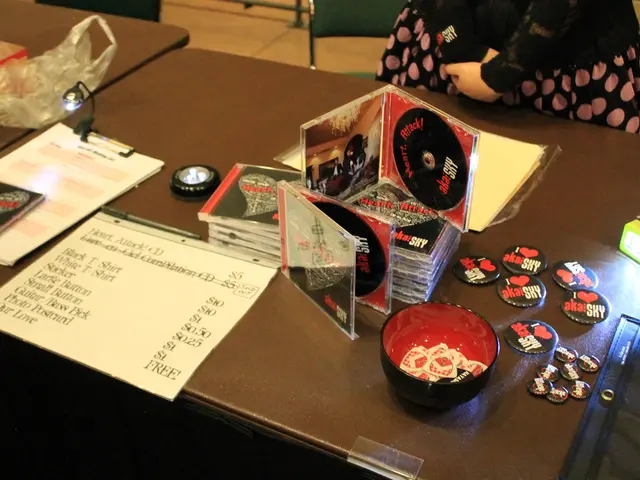Controversial: Restrictions on Semiconductor Production in China
In a complex global landscape, the United States maintains robust semiconductor export controls on China to protect national security and restrict military technology access. This is a response to growing concerns about China's advancements in technology, particularly in the field of artificial intelligence.
The U.S. tightened export controls on advanced chips in April 2022, before offering assurances on the Nvidia chips. However, there is a nuanced approach with selective easing, such as the approval of Nvidia’s H20 processor for export in mid-July 2025, after a prior ban in April.
The arguments for these export controls include national security concerns, preventing military-civil fusion, and curbing illicit transshipment. On the other hand, challenges and criticisms include effectiveness issues, Chinese tech self-reliance drive, and economic trade-offs.
The enforcement of these controls is aimed at blocking smuggling networks that funnel restricted chips through third countries like Malaysia. However, critics argue that current enforcement tools are under-resourced and outdated, with inadequate personnel and technology to monitor vast smuggling operations, allowing many restricted chips to reach China illegally.
China, in response, is aggressively pursuing domestic chip development to reduce dependence on U.S. technology and hedge against controls. This persistent push for self-sufficiency complicates the landscape, as does China's continued advancements in technology.
The U.S. is not alone in these efforts, with allies like Japan and the Netherlands also restricting advanced chip and equipment exports to China. However, the effectiveness of these controls remains a subject of debate, with some arguing that they could inadvertently help China to leapfrog the U.S. in the race to build artificial intelligence chips.
In other news, the United Nations' food agency announced it would shut half its clinics in northern Nigeria as it winds down its operations in Africa over a funding crisis. Meanwhile, in India, deaths outnumbered births by 900,000 last year, marking the largest population fall on record.
In political developments, US President Donald Trump announced an additional 25% tariff on India over its purchase of Russian oil, ratcheting up tensions with the world's most populous nation. The European Union, on the other hand, recently agreed to purchase $750 billion in American energy and invest $600 billion in US projects, a move seen as a concession to temper criticism of the Central American nation and other allies.
In a significant move, OpenAI unveiled GPT-5, a new AI model, on Thursday. The model offers significant improvements across the board, including being less prone to being confidently wrong and having better "agentic" capabilities. However, the release of GPT-5 was met with questions about its improvements, with some arguing that it could be somewhat underwhelming.
In conflict zones, the death toll in Gaza has surpassed 60,000, with many fearing the death toll could rise rapidly as Israel prepares to launch a plan to occupy Gaza City. The Israeli military head pushed back against the plan, according to The New York Times. In Ukraine, a significant majority of Ukrainians are in favor of a negotiated settlement, a sharp reversal from the beginning of the war.
In diplomatic relations, the leaders of the U.S. and Russia are expected to meet potentially as early as next week, as Washington presses for an end to Moscow's war in Ukraine. The two countries' leaders said they are committed to "defending multilateralism." Germany has paused exporting military equipment to Israel that could be used in the Gaza Strip, following international condemnation of Israel's planned takeover of Gaza City.
In environmental news, changing weather patterns, driven in large part by climate change, are having serious financial consequences. The first six months of 2025 saw about $80 billion in insured catastrophe losses worldwide, according to reinsurer Swiss Re. Wildfires across parts of Canada and the US, as well as blazes in southern France, caused significant damage and sparked warnings of the impact of extreme weather events.
In economic news, the Bank of England cut interest rates by a quarter point to 4%, after a historic split among the Monetary Policy Committee required a second vote, indicative of the uncertainties plaguing a flagging UK economy. In France, meanwhile, the prime minister described a "catastrophe on an unprecedented scale."
In technology news, Apple's move to invest an additional $100 billion in US manufacturing hands Trump another win in his tariff-driven strategy to bring investment home. However, the effectiveness of these tariffs in achieving long-term economic growth remains a subject of debate.
In summary, the landscape of semiconductor export controls is complex, with national security concerns, economic trade-offs, and the push for self-sufficiency driving U.S. policy. The effectiveness of these controls, however, remains a subject of debate, with critics arguing that they could inadvertently help China to leapfrog the U.S. in the race to build artificial intelligence chips. Meanwhile, in other global developments, the impact of tariffs, climate change, and conflicts continue to shape the world.
- The United States is taking measures to protect national security and restrict military technology access through robust semiconductor export controls, specifically targeting advanced chips in response to China's advancements in technology, particularly artificial intelligence.
- The advancements in health-and-wellness, such as the U.N.'s food agency's funding crisis leading to the shutdown of half its clinics in northern Nigeria, continue to impact global populations.
- In the field of politics, the US President Donald Trump has announced additional tariffs on India, escalating tensions with the world's most populous nation. Conversely, the European Union has agreed to invest heavily in US projects to appease criticism.
- OpenAI has unveiled GPT-5, the latest AI model, offering improvements in various aspects, including being less prone to being wrong and having better 'agentic' capabilities. However, the effectiveness of these improvements has been questioned.
- In the realm of technology and military conflicts, changing weather patterns driven by climate change are resulting in significant financial losses due to catastrophes like wildfires in Canada, the US, and France.
- The Bank of England has cut interest rates, reflecting uncertainties in the UK economy, while the French prime minister has described the economic situation as a disaster of unprecedented scale.
- In the sphere of business and finance, Apple's investment in US manufacturing following tariffs is seen as a victory, but the long-term economic impact remains debated.
- In the realm of education-and-self-development, policy-and-legislation, and general-news, the leaders of the US and Russia are expected to meet, aiming to defend multilateralism and possibly negotiate an end to Moscow's war in Ukraine. Germany has paused military equipment exports to Israel due to international condemnation.
- In the field of crime-and-justice and accidents, the death toll in Gaza has surpassed 60,000, with many fearing a rapid increase, while in Ukraine, a significant majority of Ukrainians favor a negotiated settlement. The Israeli military head has reportedly pushed back against a plan for the occupation of Gaza City.




